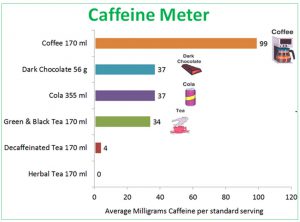Caffeine in Context
 Caffeine occurs naturally in coffee, tea and chocolate, and is added to some soft drinks and medications. On average, there is about 35 mg of caffeine in a cup of black tea, which is less than half the amount in a cup of coffee. The amount of caffeine in tea will depend on the water temperature, the number of tea leaves brewed and the length of time the leaves are steeped. The hotter and darker coloured your tea, the more caffeine it may have. The amount of caffeine is not affected by whether you use a tea bag or loose leaves to make your tea.[i] Products containing caffeine are used and enjoyed by many people throughout the world. The Caffeine Meter chart shows the contribution of various foods to caffeine intake. Health Canada states that for the average adult, moderate daily caffeine intake at levels of 400 mg/day is not associated with any adverse effects.[ii] Specific advice on moderating caffeine intake applies to women who are pregnant or breastfeeding (300 mg/day) and children (45-85 mg/day).[ii]
Caffeine occurs naturally in coffee, tea and chocolate, and is added to some soft drinks and medications. On average, there is about 35 mg of caffeine in a cup of black tea, which is less than half the amount in a cup of coffee. The amount of caffeine in tea will depend on the water temperature, the number of tea leaves brewed and the length of time the leaves are steeped. The hotter and darker coloured your tea, the more caffeine it may have. The amount of caffeine is not affected by whether you use a tea bag or loose leaves to make your tea.[i] Products containing caffeine are used and enjoyed by many people throughout the world. The Caffeine Meter chart shows the contribution of various foods to caffeine intake. Health Canada states that for the average adult, moderate daily caffeine intake at levels of 400 mg/day is not associated with any adverse effects.[ii] Specific advice on moderating caffeine intake applies to women who are pregnant or breastfeeding (300 mg/day) and children (45-85 mg/day).[ii]
_________________________________________________________________
[i] Dietitians of Canada – EatRight Ontario, Tea Time, Retrieved from http://www.eatrightontario.ca/en/Articles/Antioxidants/Tea-Time.aspx#.U1daPvldV8E (April 2014)
[ii] Health Canada, Caffeine in Food. 2012-02-16, Retrieved from www.hc-sc.gc.ca/fn-an/securit/addit/caf/food-caf-aliments-eng.php (April 2014)